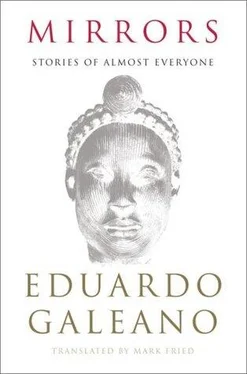The morning passes and the police do not show up.
The animal eats grass, threateningly.
The people watch from afar, fearfully.
“Watch out,” warns a journalist walking through the crowd, microphone in hand. “Careful, he might get nervous.”
Off on his own, the beast nibbles and chews, focused on the little piece of greenery he discovered amid the gray buildings.
At last police cars filled with officers arrive and they take up positions around the animal. They watch him, unsure what to do.
Then a few brave souls break out of the crowd and, demonstrating great courage and skill, leap on the wild bull. Kicking and punching, they knock him over and wrap him in chains. The camera records the moment when one of them puts his foot triumphantly on the trophy.
They take him away in a cart. His head hangs over the side. Whenever he raises it, blows rain down on him. Voices scream:
“He’s trying to escape! He’s trying to escape again!”
And thus ends the life of this little calf, an escapee from the slaughterhouse whose horns are barely beginning to show.
The plate was his fate.
He never dreamed of becoming a TV star.

In 1998, the National Directorate of the Penitentiary System of the Republic of Bolivia received a letter signed by every prisoner in a jail in the Cochabamba Valley.
The letter respectfully requested that the prison wall be made higher, for as it was, people from the neighborhood were climbing over and stealing the clothes the prisoners hung out to dry.
Since no budget was available, there was no response. And since there was no response, the prisoners had no choice but to get to work. With bricks and straw they raised the wall high enough to protect themselves from their neighbors on the other side.

For half a century, Uruguay has not won a single world soccer championship, but during the military dictatorship the country won other titles: relative to its population, it had the most political prisoners and the most victims of torture.
“Libertad” was the name of the biggest jail. Perhaps inspired by the name, imprisoned words sometimes broke out. Through the bars slid poems written on tiny cigarette papers. Like this one:
Sometimes it rains and I love you.
Sometimes it’s sunny and I love you.
The prison is sometimes.
I love you always.

The fox was on his way back from the heavens when parrots pecked through the rope he was sliding down.
The fox fell onto the high peaks of the Andes and burst apart. The quinoa in his belly, stolen from celestial banquets, sprayed everywhere.
Thus the food of the gods came to be planted in this world.
Ever since, quinoa lives in the highest lands, where it alone can withstand the dryness and the cold.
The world market ignored this useless Indian feed until two researchers at Colorado State University learned that the tiny wholesome grain, which grows where nothing else will, is not fattening and builds resistance to several diseases. And in 1994, they obtained U.S. patent number 5304718 for it.
The farmers were furious. Quinoa’s patent-holders assured them they would not use their legal rights to stop them from growing it or to charge them a fee, but the farmers, indigenous Bolivians, responded:
“We don’t need some professor from the United States to come here and donate to us what is ours.”
Four years later, the scandal was such that Colorado State University had to give up the patent.

Radio Paiwas was born in the heart of Nicaragua on the eve of the twenty-first century.
The early morning program attracts the largest audience. The Messenger Witch, heard by thousands of women, frightens thousands of men.
The witch introduces women to friends they have never met, including one named Pap Smear and an old lady named Constitution. And she talks to them about their rights, “zero tolerance for violence in the street, in the home, and in bed too,” and she asks them:
“How did it go last night? How did he treat you? Did it feel good or was it a little forced?”
And when men rape or beat women, she names names. At night, the witch flies house to house on her broom, and before dawn she rubs her crystal ball. Then she reveals on-air the secrets she has learned:
“Angel? You’re out there, I can see you. Beating your wife, are you? That’s awful, you scumbag!”
The radio receives and broadcasts the complaints the police ignore. The police are busy chasing cow thieves, and a cow is worth more than a woman.

There are more than a billion Barbies. Only the Chinese outnumber them.
The most beloved woman on the planet would never let us down. In the war of good against evil, Barbie enlisted, saluted, and marched off to Iraq.
She arrived at the front wearing made-to-measure land, sea, and air uniforms reviewed and approved by the Pentagon.
Barbie is accustomed to changing professions, hairdos, and clothes. She has been a singer, an athlete, a paleontologist, an orthodontist, an astronaut, a firewoman, a ballerina, and who knows what else. Every new job entails a new look and a complete new wardrobe that every girl in the world is obliged to buy.
In February 2004, Barbie wanted to change boyfriends too. For nearly half a century she had been going steady with Ken, whose nose is the only protuberance on his body, when an Australian surfer seduced her and invited her to commit the sin of plastic.
Mattel, the manufacturer, announced an official separation.
It was a catastrophe. Sales plummeted. Barbie could change occupations and outfits, but she had no right to set a bad example.
Mattel announced an official reconciliation.
ROBOCOP’S CHILDREN GO TO WAR

In the year 2005, the Pentagon disclosed that its dream of an army of automatons is coming true.
According to spokesman Gordon Johnson, the wars in Afghanistan and Iraq have been tremendously valuable for the robots’ progress. Now robots equipped with night vision and automatic weapons are able to locate and destroy enemy emplacements with practically no margin of error.
No trace of humanity diminishes their optimum efficiency:
“They don’t get hungry, they’re not afraid, they don’t forget their orders,” Johnson said. “They don’t care if the guy next to them has just been shot.”

At the beginning of the twentieth century, Colombia suffered through a thousand-day war.
In the middle of the twentieth century, the war lasted three thousand days.
At the outset of the twenty-first century, the days of the war have become too numerous to count.
But this war, fatal for Colombia, is not so fatal for Colombia’s owners:
the war feeds fear, and fear turns injustice into an inescapable fate;
the war feeds poverty, and poverty supplies hands that will work for little or nothing;
Читать дальше



















